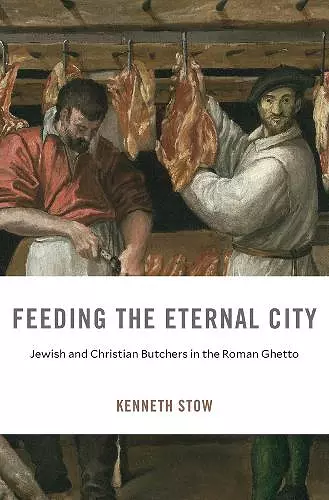Feeding the Eternal City
Jewish and Christian Butchers in the Roman Ghetto
Format:Hardback
Publisher:Harvard University Press
Published:27th Sep '24
Should be back in stock very soon

A surprising history of interfaith collaboration in the Roman Ghetto, where for three centuries Jewish and Christian butchers worked together to provision the city despite the proscriptions of Church law.
For Rome’s Jewish population, confined to a ghetto between 1555 and 1870, efforts to secure kosher meat were fraught with challenges. The city’s papal authorities viewed kashrut—the Jewish dietary laws—with suspicion, and it was widely believed that kosher meat would contaminate any Christian who consumed it. Supplying kosher provisions entailed circumventing canon law and the institutions that regulated the butchering and sale of meat throughout the city.
Kenneth Stow finds that Jewish butchers collaborated extensively with their Christian counterparts to ensure a supply of kosher meat, regardless of the laws that prohibited such interactions. Jewish butchers sold nonkosher portions of slaughtered animals daily to Christians outside the ghetto, which in turn ensured the affordability of kosher meat. At the same time, Christian butchers also found it profitable to work with Jews, as this enabled them to sell good meat otherwise unavailable at attractive prices. These relationships could be warm and almost intimate, but they could also be rife with anger, deception, and even litigation. Nonetheless, without this close cooperation—and the willingness of authorities to turn a blind eye to it—meat-eating in the ghetto would have been nearly impossible. Only the rise of the secular state in the late nineteenth century brought fundamental change, putting an end to canon law and allowing the kosher meat market to flourish.
A rich social history of food in early modern Rome, Feeding the Eternal City is also a compelling narrative of Jewish life and religious acculturation in the capital of Catholicism.
A testament at once to prejudice, resourcefulness, and cooperation, this is an account of more than 300 years of efforts by Roman butchers to circumvent laws which restricted the supply of kosher meat to the city’s Jewish population…uses a rich body of evidence to expose the extensive efforts of authorities to suppress Jewish identity in Rome, and in the process reveals much about how the city obtained its food and what was eaten. * Kitchen Arts & Letters *
A compelling, revealing, and entertaining account of Jewish and Christian butchers in early modern Rome. Stow deftly narrates this fascinating history, full of complicated disputes and labyrinthine intrigue, but also surprising collaborations. The result is a remarkable portrait of butchers' efforts to provide a basic and all-too-perishable product. -- Paul Freedman, author of Why Food Matters
Tracing the culinary history of the Jewish ghetto in the capital of the Catholic world, Kenneth Stow offers a unique perspective on Jewish-Christian relations from the onset of confessional conflict until the establishment of the modern Italian state. Stow builds on his unparalleled knowledge of both early modern Rome and the papacy's Jewry policies, giving us a rich account of daily life and material culture that is also a business history, a religious history, and a history of the senses. Ultimately, the story that he tells is deeply connected to broader questions of attitudes toward the Jews and the foods they have prepared and consumed across the centuries. -- Tamar Herzig, author of A Convert’s Tale: Art, Crime, and Jewish Apostasy in Renaissance Italy
In Feeding the Eternal City, Kenneth Stow produces the first comprehensive study of food practices and butchering in the Roman ghetto. This engaging and deeply researched book is a must-read for scholars interested in the history of Rome, food, or Judaism. -- Bradford A. Bouley, author of Pious Postmortems: Anatomy, Sanctity, and the Catholic Church in Early Modern Europe
ISBN: 9780674297395
Dimensions: 235mm x 156mm x 19mm
Weight: 577g
288 pages